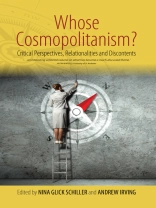The term cosmopolitan is increasingly used within different social, cultural and political settings, including academia, popular media and national politics. However those who invoke the cosmopolitan project rarely ask whose experience, understanding, or vision of cosmopolitanism is being described and for whose purposes? In response, this volume assembles contributors from different disciplines and theoretical backgrounds to examine cosmopolitanism’s possibilities, aspirations and applications—as well as its tensions, contradictions, and discontents—so as to offer a critical commentary on the vital but often neglected question: whose cosmopolitanism? The book investigates when, where, and how cosmopolitanism emerges as a contemporary social process, global aspiration or emancipatory political project and asks whether it can serve as a political or methodological framework for action in a world of conflict and difference.
Mục lục
List of Illustrations
Acknowledgements
Introduction: What’s In a Word? What’s in a Question?
Andrew Irving and Nina Glick Schiller
PART I: THE QUESTION OF WHOSE COSMOPOLITANISM? PROVOCATIONS AND RESPONSES
Provocations
Chapter 1. Whose Cosmopolitanism? Multiple, Globally Enmeshed and Subaltern
Gyan Prakash
Chapter 2. Whose Cosmopolitanism? Genealogies of Cosmopolitanism
Galin Tihanov
Chapter 3. Whose Cosmopolitanism? And Whose Humanity?
Nina Glick Schiller
Chapter 4. Whose Cosmopolitanism? The Violence of Idealizations and the Ambivalence of Self
Jackie Stacey
Chapter 5. Whose Cosmopolitanism? Postcolonial Criticism and The Realities of Neo-Colonial Power
Robert Spencer
Responses
Chapter 6. The Performativity and Suspension of Disbelief
Jacqueline Rose
Chapter 7. What Do We Do With Cosmopolitanism?
David Harvey
Chapter 8. Cosmopolitan Theory and the Daily Pluralism of Life
Tariq Ramadan
Chapter 9. Chance, Contingency and the Face to Face Encounter
Andrew Irving
Chapter 10. Cosmopolitanism and Intelligibility
Sivamohan Valluvan
PART II: THE QUESTIONS OF WHERE, WHEN, HOW, AND WHETHER: TOWARDS A PROCESSUAL SITUATED COSMOPOLITANISM
Whose Encounters, Landscapes and Displacements?
Chapter 11. ‘It’s Cool to be Cosmo’: Tibetan Refugees, Indian Hosts, Richard Gere and ‘Crude Cosmopolitanism’ in Dharamsala
Atreyee Sen
Chapter 12. Diasporic Cosmopolitanism: Migrants, Sociabilities and City-Making
Nina Glick Schiller
Chapter 13. Freedom and Laughter in an Uncertain World: Language, Expression and Cosmopolitanism Experience
Andrew Irving
Cinema, Literature and the Social Imagination
Chapter 14. Narratives of Exile: Cosmopolitanism beyond the Liberal Imagination
Galin Tihanov
Chapter 15. The Uneasy Cosmopolitans of Code Unknown
Jackie Stacey
Chapter 16. Pregnant Possibilities: Cosmopolitanism, Kinship and Reproductive Futurism in Maria Full of Grace and In America
Heather Latimer
Chapter 17. Backstage/Onstage Cosmopolitanism: Jia Zhangke’s The World
Felicia Chan
Endless War or Domains of Sociability? Conflict, Instabilities and Aspirations
Chapter 18. Politics, Cosmopolitics and Preventive Development at the Kyrgyzstan-Uzbekistan Border
Madeleine Reeves
Chapter 19. Memory of War and Cosmopolitan Solidarity
Ewa Ochman
Chapter 20. Cosmopolitanism and Conviviality in an Age of Perpetual War
Paul Gilroy
Notes on Contributors
Index
Giới thiệu về tác giả
Andrew Irving is Director of the Granada Centre for Visual Anthropology at the University of Manchester. His research areas include sensory perception, time, illness, death, urban anthropology, and experimental methods. Recent publications include Beyond Text: Critical Practices and Sensory Anthropology (2014 Manchester University Press) and “The Suicidal Mind” in Mediating and Remediating Death (2014 Ashgate).












